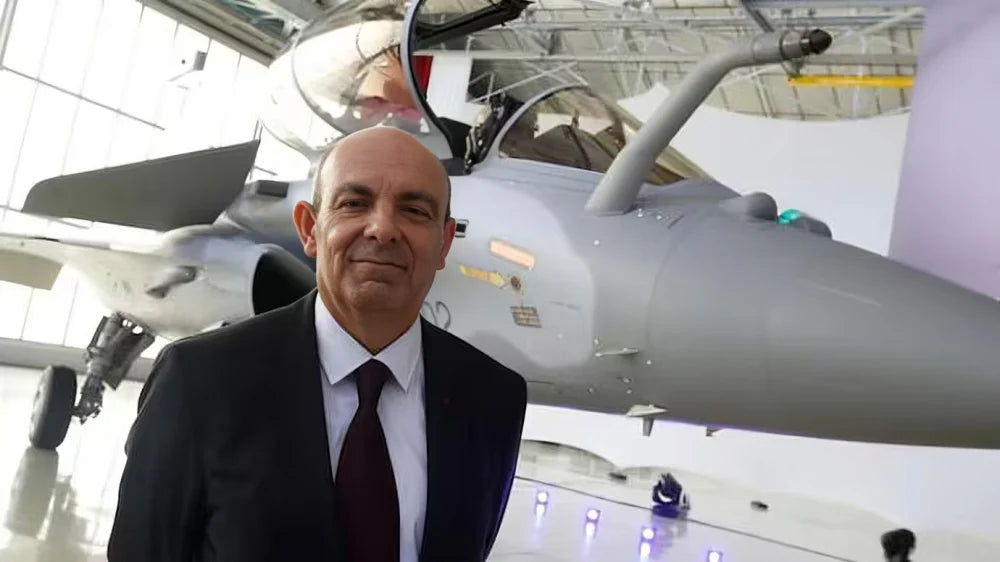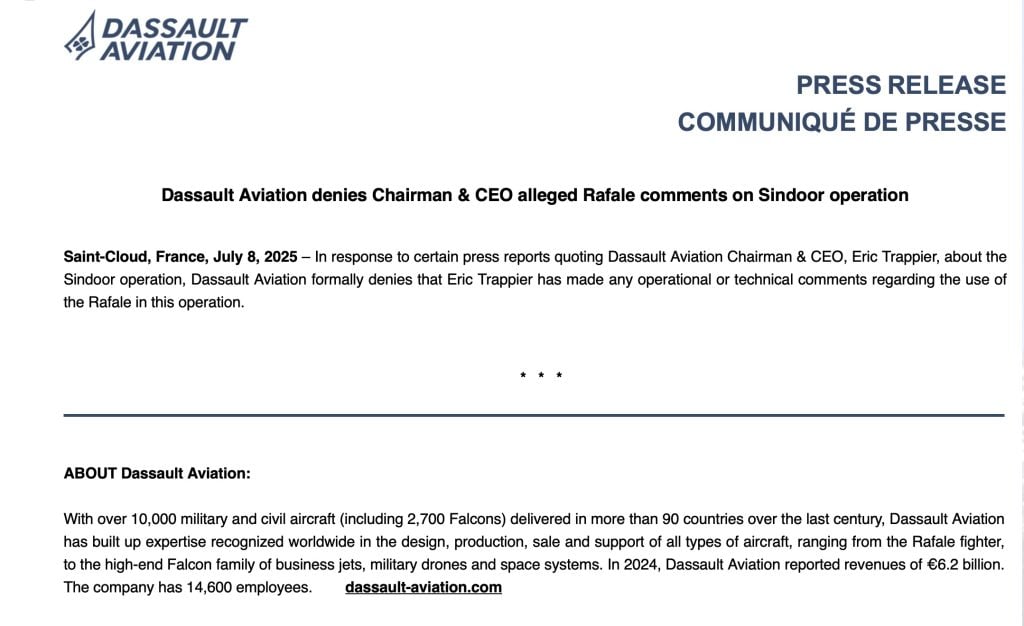Dassault Refutes Rafale Jet Loss Reports and Clarifies CEO Remarks

According to The Economic Times, Operation Sindoor began on May 7 with India initiating an intense air operation. In response, Pakistan's Air Force quickly declared that it had downed five Indian jets, including three Rafales, with its J-10C fighters armed with PL-15E missiles. However, no supporting evidence for these claims has emerged.
Eric Trappier, Chairman and CEO of Dassault Aviation, clarified the situation by stating that the loss of aircraft was due to a "technical failure at high altitude," rather than being the result of enemy missiles. Reports indicated that he described Pakistan's assertions as "inaccurate and unfounded" during conversations with Avion De Chasse. The aircraft's Spectra electronic warfare suite, which is designed to detect threats, did not register any hostile contact, and flight logs corroborated this account.
Adding to the ongoing narrative, Dassault Aviation released a statement countering certain media reports. The official statement read: "In response to certain press reports quoting Dassault Aviation Chairman & CEO, Eric Trappier, about the Sindoor operation, Dassault Aviation formally denies that Eric Trappier has made any operational or technical comments regarding the use of the Rafale in this operation."
Also Read: ‘No Rafale Shot Down in Combat, India Lost One Due To Technical Malfunction, Probe On’: Dassault CEO

The incident has sparked a broader controversy, with France’s Defence Ministry accusing China’s embassies of conducting a targeted disinformation campaign. This effort allegedly aimed to undermine Rafale sales and promote the J-10C as a more cost-effective alternative. French intelligence has identified manipulated images, AI-generated videos, and numerous new social media accounts spreading rumors of Rafale losses.
A Defence Ministry note stated, "The Rafale was not randomly targeted. By attacking the aircraft, certain actors sought to undermine the credibility of France and its defence industrial and technological base." For France, the issue extends beyond aircraft, impacting its reputation as a significant arms exporter and dependable ally.
India's reaction has been somewhat inconsistent. Defence Secretary RK Singh told CNBC TV-18, "You have used the term Rafales in the plural, I can assure you that is absolutely not correct. Pakistan suffered losses many times over India in both human and material terms, and more than 100 terrorists."
Captain Shiv Kumar, India's defence attaché to Indonesia, acknowledged the loss of Indian jets on the first day but attributed it to government restrictions limiting strikes to terror camps. He stated, "I may not agree that India lost so many aircraft. But I do agree that we did lose some aircraft, and that happened only because of the constraint given by the political leadership to not attack the military establishments and their air defences."
Meanwhile, General Jerome Bellanger, the French Air Force Chief, provided another perspective, telling The Associated Press he witnessed evidence of India losing a Mirage 2000, a Sukhoi, and a Rafale. If confirmed, this would be the first combat loss of a Rafale among the 533 built, of which 323 have been sold internationally to countries including Egypt, Qatar, UAE, Greece, Croatia, Serbia, Indonesia, and India.
Trappier, however, maintains that the "loss of one aircraft" was unrelated to Pakistani actions, noting the wreckage was found over 12,000 meters mid-training, away from enemy radar detection.
Pakistan did not emerge unscathed from the clashes. Air Marshal AK Bharti informed reporters that India shot down several Pakistani jets, preventing them from entering Indian airspace. He said, "We definitely shot down several planes, and they have suffered losses on their part." Unofficial accounts suggest Pakistan lost various aircraft, including three JF-17 Thunders, two Mirage III/V, an F-16, a C-130 Hercules, and two Saab Erieye-2000 surveillance planes.
The loss of one of these AEW&CS aircraft is significant, as they serve as the eyes and ears of modern air forces, detecting fighters and missiles long before ground-based radars can.
French officials claim China's motives are clear: discrediting the Rafale strengthens the appeal of its J-10C fighters. As reported by the EurAsian Times, Rafale exports have bolstered France's international influence, particularly in Asia, where China seeks to expand its presence.
In response, Beijing dismissed the accusations, stating, "The relevant claims are pure groundless rumours and slander. China has consistently maintained a prudent and responsible approach to military exports."
Despite the controversy, Dassault Aviation's stock has begun to recover after a temporary decline. The shares opened slightly higher at €297.40 on July 8, following Defence Secretary RK Singh's dismissal of Pakistan's claims.



















